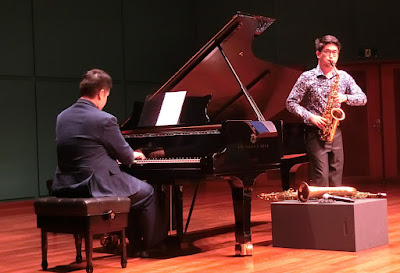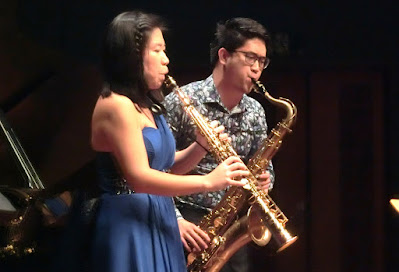RHAPSODIC STORIES
Samuel Phua & Friends
Esplanade Recital Studio
Saturday (22 October 2022)
When it comes to the classical saxophone in Singapore, one name stands out: Samuel Phua. The young saxophonist made history in 2014 by being the first non-pianist and non-string instrumentalist to be invited to perform at the Singapore Symphony Orchestra’s President’s Young Performers Concert Series. He has also been the go-to guy for the saxophone solos in Kelly Tang’s jazz piano concerto Montage, playing alongside local jazz legend Jeremy Monteiro.
Rhapsodic Stories was the fruition of a Covid pandemic project bringing together newly composed or arranged saxophone works by no less than nine Singaporean composers. Its gripping two hours could not have passed more easily or interestingly, simply because of the sheer variety of music presented and virtuosity on display. And one never knew the existence of so many excellent local saxophone works.
The evening opened with Terrence Wong’s Out-Do You Do?, a duet and duel with fellow saxophonist Michellina Chan, who shared much of the programme with Samuel. Its thematic motifs were relatively simple but nimble, like those of Paganini’s Caprices, but soon one was occupied by the tricky interplay of both instrumental parts. Melodic interest and accompaniment regularly exchanged places, with each player reacting to the other’s moves and antics, culminating with a single long-held note from Samuel at the end.
Jonathan Shin and Christopher Clarke’s Aria from Music About The Downtown Line was a short, slow and reflective number oozing with nice harmonies, accompanied by Abigail Sin on piano. Derek Oh was a constant companion to Samuel when they both studied at the Sibelius Academy in Helsinki. Oh’s The Grey Birch was a reflection of a desolate Finnish winter coloured with Chinese sensibilities. The stasis and starkness consuming the music ensured that one could feel the chill. After a loud and declamatory cadenza, the work just dissipated and evaporated into the cold mist.
Tan Yuting’s But I Am The Lallang was inspired by a poem by Lim Thean Soo (1924-1991) exulting the resilience of the local weed, known for its hardiness and ubiquity. The unaccompanied solo incorporated various noteless sound effects, including passages of wind blown through the tubes and pauses of silence. The lallang is portrayed as unchanging, a silent witness to history and timeless voice of eternity.
Zechariah Goh Toh Chai is the veteran among the group of Singaporean composers, besides being a saxophone exponent himself. His Suite was also the oldest local work on the programme, comprising two vastly contrasting movements. Alone and Distant had slow, long-breathed lines with an Oriental feel evoking emptiness and homesickness. Flowing was fast, syncopated and jazzy, utilising extended piano techniques with Abigail stroking the strings and Samuel blowing into the piano’s insides. Further beats were provided by very audible tapping on the saxophone’s keys. Sandra Lim’s Morning Memories, originally for violin and piano, was arguably the lightest work on show, with a pop melody that could have come from the pens of Michel Legrand or Dick Lee.
Gershwin’s immortal Rhapsody in Blue as arranged by Jun Nagao has both saxophone and piano parts as equal protagonists. This called for the outsized virtuosity of Clarence Lee in the piano role, which perfectly complemented Samuel performing on three saxophones. Part of the nervy act was to witness him adroitly swapping instruments without missing a cue (or dropping any of them on the floor). Much of the full score was retained, with the orchestral parts (alternated between sax and piano) sounding more demanding than possibly imagined. This was an entertaining show that delighted and thrilled.
Joseph Lim’s Epic Poem of Malaya was inspired by local artist Chua Mia Tee’s famous 1955 painting of the same title now on display at the National Gallery. Epic indeed was the sheer size and sonority of the baritone saxophone played by Michellina, its deep stentorian voice mimicking the painting’s orator with his rhetoric and gestures. Using Chinese idioms and Malay dance rhythms, this is not just a soliloquy but a reflection of local history and its vicissitudes. Convincingly conveyed by Michellina, it was a minor miracle that she managed to maintain her balance without keeling over.
Closing the recital was London-based composition student’s Elliott Teo Dirge and Dance for two saxophones and piano, which has the makings of an epic tragedy. Big piano chords (back with Abigail Sin) accompanied the dirge which exuded a Slavic lugubriousness but coloured by Klezmer vibes. Making for very effective film music, this segued into the lively and animated dance, where the combo between high and low register voices really shone. The result was a very impressive end to the concert.
As an encore, Kousuke Yamashita’s Eternal Story saw all four musicians in a sentimental number that demonstrated that with saxophones, one could be both entertaining and also taken seriously. Long may Samuel Phua, the one-man sax maniac, continue to champion the saxophone, inspiring new works and further enriching Singapore’s burgeoning musical scene.













No comments:
Post a Comment